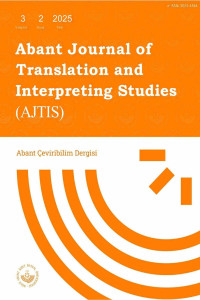Abstract
Bu çalışma, feminist çeviri kuramı çerçevesinde eşdeğerlik, çevirmenin öznelliği ve yeniden yazma kavramlarını kuramsal düzlemde ele almaktadır. Geleneksel çeviri anlayışının nesnellik ve tarafsızlık varsayımına karşı çıkan feminist çeviri kuramı, çevirmenin ideolojik konumunu, politik etkenliğini ve toplumsal cinsiyet perspektifini ön plana çıkarır. Bu bağlamda eşdeğerlik, dilsel sadakatten ziyade feminist müdahaleyle biçimlenen etik ve yorumlayıcı bir eylem olarak yeniden tanımlanır. Çevirmenin öznelliği, ataerkil söylemlerin sorgulanmasına, alternatif anlatıların oluşturulmasına ve dışlanmış seslerin yeniden temsiline imkân tanıyan merkezî bir unsurdur. Lefevere’in ortaya koyduğu yeniden yazma kavramı, Simon, von Flotow ve Godard gibi feminist kuramcılar tarafından ideolojik yeniden konumlanma olarak yorumlanmış ve dönüştürücü bir edim olarak ele alınmıştır. Bu çalışma, feminist kuramsal katkıları eleştirel biçimde bir araya getirerek, çeviriyi yalnızca bir aktarım süreci değil, anlamın yeniden üretildiği, ideolojik müzakerenin gerçekleştiği bir direniş alanı olarak konumlandırmaktadır. Makale, çeviriyi feminist bir eylemlilik biçimi olarak değerlendirerek, baskın söylemleri sorgulayan ve toplumsal cinsiyet bilinciyle şekillenen çeviri yaklaşımlarına kuramsal katkı sunmayı hedeflemektedir.
References
- Baker, M. (1992). In other words: A coursebook on translation. Routledge.
- Catford, J. C. (1965). A linguistic theory of translation: An essay in applied linguistics. Oxford University Press.
- Derrida, J. (1976). Of grammatology (G. C. Spivak, Trans.). Johns Hopkins University Press.
- Godard, B. (1988). Theorizing feminist discourse/translation. Tessera, (6), 42–53.
- Göl, G. (2015). Feminizm ve çeviri: Kadın çevirmenler ve feminist çeviri kuramı. Phoenix Yayınevi.
- House, J. (1997). Translation quality assessment: A model revisited. Narr.
- Lefevere, A. (1992). Translation, rewriting, and the manipulation of literary fame. Routledge.
- Levine, S. J. (1991). The subversive scribe: Translating Latin American fiction. Graywolf Press.
- Nida, E. A. (1964). Toward a science of translating: With special reference to principles and procedures involved in Bible translating. Brill.
- Pirpir, Y. (2018). Feminist yayınevleri Ayizi ve Güldünya örnekleri ışığında Türkiye’de feminist çeviri yaklaşımlarına ve feminist çevirmen kimliğine genel bakış. (Yayımlanmamış yüksek lisans tezi). tez.yok.gov.tr (511899.).
- Roth, K. (1997). Rethinking equivalence: Gender and translation. In M. Mezei (Ed.), Gendering discourse/translating gender (pp. 43–58). University of Ottawa Press.
- Simon, S. (1996). Gender in translation: Cultural identity and the politics of transmission. Routledge.
- Spivak, G. C. (1993). The politics of translation. In L. Venuti (Ed.), The translation studies reader (pp. 397–416). Routledge.
- Venuti, L. (1995). The translator’s invisibility: A history of translation. Routledge.
- von Flotow, L. (1991). Feminist translation: Contexts, practices and theories. TTR: Traduction, terminologie, rédaction, 4(2), 69–84.
- von Flotow, L. (1997). Translation and gender: Translating in the 'era of feminism'. St. Jerome Publishing.
Abstract
This study examines the interrelated concepts of equivalence, translator subjectivity, and rewriting within the framework of feminist translation theory. Departing from traditional notions of objectivity and neutrality in translation, feminist translation theory foregrounds the translator’s ideological position, political agency, and gendered perspective. In this context, equivalence is reconceptualized not as linguistic fidelity, but as an ethical and interpretive act shaped by feminist intervention. Translator subjectivity is central to this process, as it enables the translator to question patriarchal discourses, introduce alternative narratives, and reclaim space for marginalized voices. Rewriting, as articulated by Lefevere and further developed by feminist scholars such as Simon, von Flotow, and Godard, is approached as a deliberate and transformative act of ideological repositioning. Through a critical synthesis of feminist theoretical contributions, this study argues that translation is a site of resistance and negotiation where meaning is actively constructed rather than passively transferred. The paper contributes to feminist translation studies by highlighting the strategic potential of translation as a feminist practice that challenges dominant discourses and fosters gender-conscious textual reproduction.
References
- Baker, M. (1992). In other words: A coursebook on translation. Routledge.
- Catford, J. C. (1965). A linguistic theory of translation: An essay in applied linguistics. Oxford University Press.
- Derrida, J. (1976). Of grammatology (G. C. Spivak, Trans.). Johns Hopkins University Press.
- Godard, B. (1988). Theorizing feminist discourse/translation. Tessera, (6), 42–53.
- Göl, G. (2015). Feminizm ve çeviri: Kadın çevirmenler ve feminist çeviri kuramı. Phoenix Yayınevi.
- House, J. (1997). Translation quality assessment: A model revisited. Narr.
- Lefevere, A. (1992). Translation, rewriting, and the manipulation of literary fame. Routledge.
- Levine, S. J. (1991). The subversive scribe: Translating Latin American fiction. Graywolf Press.
- Nida, E. A. (1964). Toward a science of translating: With special reference to principles and procedures involved in Bible translating. Brill.
- Pirpir, Y. (2018). Feminist yayınevleri Ayizi ve Güldünya örnekleri ışığında Türkiye’de feminist çeviri yaklaşımlarına ve feminist çevirmen kimliğine genel bakış. (Yayımlanmamış yüksek lisans tezi). tez.yok.gov.tr (511899.).
- Roth, K. (1997). Rethinking equivalence: Gender and translation. In M. Mezei (Ed.), Gendering discourse/translating gender (pp. 43–58). University of Ottawa Press.
- Simon, S. (1996). Gender in translation: Cultural identity and the politics of transmission. Routledge.
- Spivak, G. C. (1993). The politics of translation. In L. Venuti (Ed.), The translation studies reader (pp. 397–416). Routledge.
- Venuti, L. (1995). The translator’s invisibility: A history of translation. Routledge.
- von Flotow, L. (1991). Feminist translation: Contexts, practices and theories. TTR: Traduction, terminologie, rédaction, 4(2), 69–84.
- von Flotow, L. (1997). Translation and gender: Translating in the 'era of feminism'. St. Jerome Publishing.
Details
| Primary Language | English |
|---|---|
| Subjects | Translation and Interpretation Studies |
| Journal Section | Research Articles |
| Authors | |
| Publication Date | August 25, 2025 |
| Submission Date | July 15, 2025 |
| Acceptance Date | August 25, 2025 |
| Published in Issue | Year 2025 Volume: 3 Issue: 2 |

